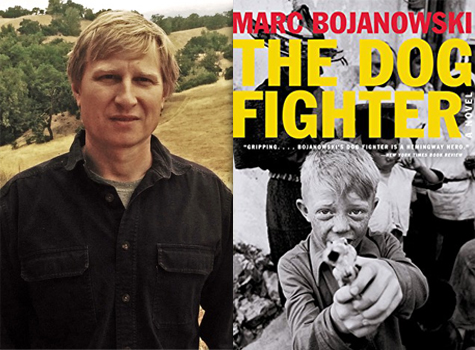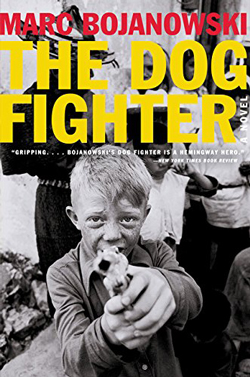
I picked up a strange book called The Dog Fighter without any prior knowledge of the author. This was in 2004, and the high praise this debut novel was getting intrigued me enough to give it a shot. One of the hooks was that the writer used no punctuation beyond periods and question marks. No quotations, no contractions, and not a comma in sight. (At the time, I’d never read Cormac McCarthy. Forgive me.)
So, I gave it a shot.
The book was good. Very literary, but it had a sleazy side I liked. I decided to keep an eye on this young upstart, Marc Bojanowski.
But, like I said, that was 12 years ago. What happened to the brilliant young author who the New York Times likened to Hemingway and was worthy of such praise as:
“An exceptional story of human loneliness and passion that will haunt every reader.” (Library Journal)
“This debut novel twists into a poetic justice that delves deeper than shocking bloodletting scenes.” (Chicago Tribune)
“Bojanowski [is] a daring new voice in American fiction.“ (Outside)
Theories abound, but when Bojanowski went dark, he really went dark. Little has been written about him and he hasn’t put a new novel out into the world since that celebrated debut more than a decade ago.
 At the time, Bojanowski was twenty-seven—virtually wunderkind territory for book reviewers who love to make hay out of such things. A graduate of Cal Berkeley and The New School MFA program, he had the pedigree. Despite The Dog Fighter being a sordid tale of a young man who fights dogs for money and the almost pulp fiction turns the story takes, the novel was sold as a literary achievement, not a genre piece.
At the time, Bojanowski was twenty-seven—virtually wunderkind territory for book reviewers who love to make hay out of such things. A graduate of Cal Berkeley and The New School MFA program, he had the pedigree. Despite The Dog Fighter being a sordid tale of a young man who fights dogs for money and the almost pulp fiction turns the story takes, the novel was sold as a literary achievement, not a genre piece.
But, even in the molasses-paced world of publishing, twelve years is a long time—especially for a guy who once gave the advice, “I’d recommend reading everything and writing every day.”
If he’s been writing every day, where does it all go? He’s popped up only occasionally in all that time, like in Issue 22 of McSweeney’s. But, for novels? Nothing.
Even at the time of his debut, his interaction with the press was more J. D. Salinger than Hemingway. From an LA Times interview:
He has no cell phone. Doesn't believe in them. And he has no home. Is temporarily camping at his parents' house. Or maybe in their tool shed (he never says which).
The shed is the place from which he eventually calls a reporter's answering machine. But instead of leaving word on how to reach him for an interview, he interviews himself. On the machine:
Bojanowski: ”How would you describe your new book?“
Bojanowski: ”It's a love story.“
Bojanowski: ”Where are you from and what was your childhood like?“
Bojanowski: ”I am from what was once a rural portion of Northern California. My childhood was idyllic. We were let loose to run in oak savannas, and it shaped our imaginations.”
Of his unique style, Bojanowski did credit McCarthy more than Hemingway, and he explained his use of only periods instead of commas as an attempt to get the reader to slow down. “There are new ways to read. I am trying to get people to do it more carefully. We're not careful enough.”
He also confessed he felt his debut novel was, “Terribly flawed.” The easy speculation is to think writer’s block—the dreaded sophomore slump. It’s the stuff of writing legend: debut novel is critically hailed; a new, important voice has emerged; how to keep up with that pressure. But, there’s no sign that was the case with Bojanowski.
He settled back into life in Northern California and has taught writing at Santa Rosa Junior College. And, lo and behold, after some digging, I found an answer to what he’s been doing all this time. He has a new novel coming out.
Journeyman is due on Valentine’s Day 2017 and will break the long drought by a once rising talent. And, as the magazine SF Gate said in its initial review of The Dog Fighter, “Where the author will go next with his writing—both its style and setting—is worth looking forward to.”
To learn more or order a copy, visit:
opens in a new window![]() opens in a new window
opens in a new window![]() opens in a new window
opens in a new window![]()
Eric Beetner is the author of more than a dozen novels including Rumrunners, The Devil Doesn't Want Me, Dig Two Graves, Run For The Money, andThe Year I Died Seven Times. His award-winning stories have appeared in over twenty anthologies including Unloaded: Crime Writers Writing Without Guns, which he created and edited. He is co-author (with JB Kohl) of One Too Many Blows To The Head, Borrowed Trouble, and Over Their Heads, and co-wrote The Backlist and The Short List with author Frank Zafiro. He lives in Los Angeles where he co-hosts the Noir At The Bar reading series. For more visit ericbeetner.com
